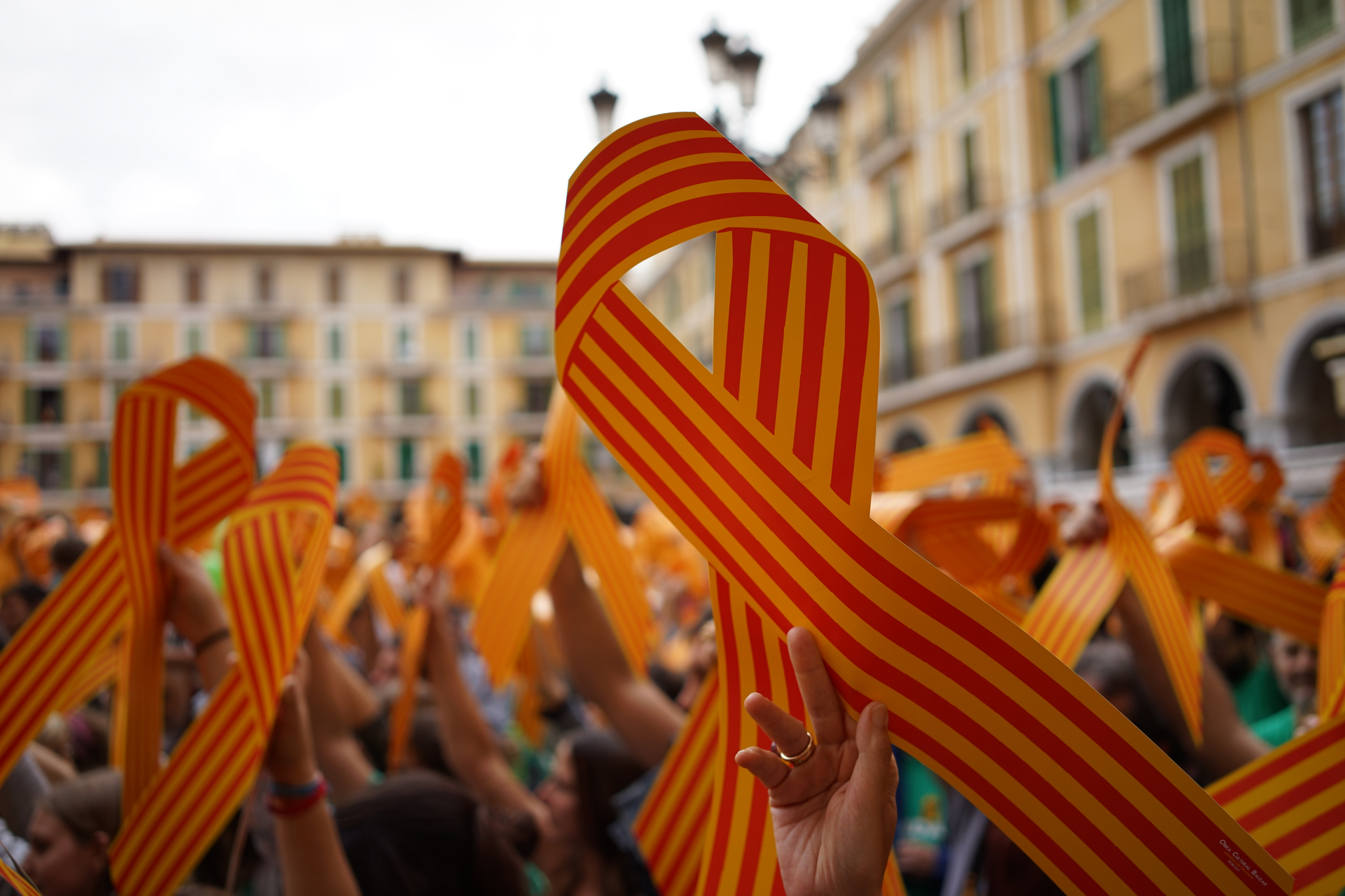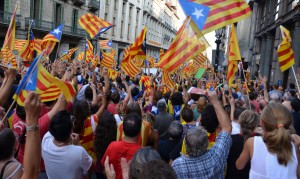Franco’s Last Breath: On Catalan Independence
Catalonia’s desire for independence has resurged in recent years, thanks in large part to the intransigence of the central Spanish government in Madrid. Historian Eric Smith reviews the history and background of the Catalan independence movement.

People attending the 2014 Diada, a Catalan National Holiday, waving ribbons with the Catalan flag. Photo Marcoil CC-BY-4.0
Catalonia has long had dreams of independence. It once contained more than half of the land and population of the Kingdom of Aragon, and in the late 19th century erupted in independence fervor. Spain’s Second Republic granted the region a status of autonomy in the 1930s that Francisco Franco with his visions of fascist nationalism would not tolerate. He ended it by decree in August 1938 six months before the civil war ended. What has become increasingly apparent amid the recent dispute over Catalan independence is that this aspect of Francoism remains very much alive, and the Catalan crisis might be the infamous fascist’s dying breath.
Anti-Catalan sentiment during the Spanish Civil War erupted in a wave of atrocities that Paul Preston documents in his book The Spanish Holocaust. Franco’s goal was genocide against Republicans, his primary motivation for prolonging the war after he had already assumed control. Catalans were among the strongest supporters of the Spanish Republic, and they faced the brunt of Franco’s wrath: even after the purge of tens of thousands, many republican women were forced into prostitution; women and their children were imprisoned; properties were stolen; Barcelona’s infrastructure was left to languish long after other parts of the country were rebuilt; in fact, too many examples exist to recount here. That Franco has escaped an historical indictment that would place him alongside other abhorrent figures of the twentieth century attests to both the success of the dictator’s propaganda and to democracies willing to forgive a reliable anti-communist ally.
Spain’s Second Republic granted the region autonomy, which Franco would not tolerate.
Franco envisioned a nationalist Spain where none had historically existed: extreme measures were required. As the Catalan government’s website explains: “The clear objective of Franco’s regime was the elimination of all that was related to Catalonia.” Franco planned to erase Catalan culture with an internal colonization project that brought Spaniards from other parts of the country into cities like Barcelona. The Catalan language was long banned from most public or official use, though it survived in the homes of Catalans where it continued to be spoken.
With Franco’s death and the transition to democracy the Catalans feared a new civil war and toned down their regional ambitions. The 1978 Constitution granted the Basques and Catalans some autonomy. But whereas the Basques earned fiscal as well as political autonomy along a federated model, the Constitution provided the same for the Catalans minus the fiscal governance, which was retained by the national government. A statute proposed by the Catalans, debated in Madrid by the Cortes, and adopted in 1979 named Catalan one of Spain’s four official languages, and granted Catalonia control over education, its own police force (considering the role of the national police during the Civil War), as well as local decision-making with respect to heritage and culture. But the statute was greatly diminished from what the Catalans had originally sought and was finally approved by the Catalans with great disappointment and a 40 percent abstention.
Today, Franco’s acrimony with the Catalans lives on in Castilian-speaking regions, where daily discourse in some media outlets lambastes the Catalans in language that sounds eerily similar to what was heard in the Balkans in the run-up to the violent civil conflicts of the 1990s. (Following the intentional crash of the Germanwings flight into the Alps, one Spanish commentator stated publicly that it was too bad the flight wasn’t filled with Catalans.)
In one recent attack, the Minister of Education urged the “Spanish-izing” of Catalonia—just as Franco had tried to do.
The national government in Madrid has long antagonized Catalonia. With a tax structure that favors poorer regions like Extremadura at their expense, Catalan highways and schools are underfunded compared to other regions. When Madrid decided to build a high-speed train, it bypassed Catalonia entirely. The culture too has been under attack. Pervasive misinformation about Catalan education—like the untrue claim that the Spanish language is banned in Catalonia’s schools—fans the flames. In one recent attack, the Minister of Education urged the “Spanish-izing” of Catalonia—just as Franco had tried to do. Other Spaniards have been trying to sustain a boycott against Catalan made goods.
Just as important, Catalans of non-Catalan ancestry clearly identify with the culture they are part of, so that even that demographic has come to support the independence movement, contrary to what President Mariano Rajoy and other members of the People’s Party (PP) claim. The movement is not “racial.” It is interesting to note that the neighboring province of Valencia, which also speaks Catalan but calls it Valenciano, has not endured the same hostility as its northern neighbor, in large part because Valencians have long voted the correct way, that is for PP.
A series of political decisions by Madrid from the Law on Self-Governing communities to the watered-down Statute have thwarted Catalan ambitions to this point. Catalonia contributes 20 percent of Spain’s GDP, yet holds less than a sixth of the country’s population. No wonder Madrid simply refuses to let the region leave.
All of this has aroused the latent spirit of independence. The more moderate demand for regional autonomy was rebuffed by Rajoy and his ruling conservatives, and his predecessor, the socialist José Luis Rodríguez Zapatero mishandled a potential solution to the problem. With the PP’s refusal to negotiate federalism, the Catalan government resorted to calling early elections as a referendum on independence. The Catalans as a whole didn’t necessarily want independence before, but Rajoy’s refusal to discuss any Catalan grievances—let alone federalism—has increased support for independence.
Several years ago a Spanish Colonel and the Association of Spanish Soldiers (AME) threatened military action should Catalonia secede. The Colonel was removed from his post but given Spanish history such threats cannot be taken lightly. Catalan former president Artur Mas, outflanked on a referendum on independence, raised the specter of a constitutional crisis once again with indications that a new Catalan constitution independent of Spain is in the works. The potential for violence in the other direction also remains. Not permitting dialogue and stubbornly refusing the Catalans could promote desperation among young Catalan idealists who then might turn to violence the way ETA once did.
The obvious solution of federalism may already have passed. Rajoy refused to stand down, repeatedly calling the Catalan ambitions “a joke,” the same word used by the PP’s Catalan MP, Xavier García Albiol whose party was then routed. But will Spain’s leaders exacerbate the crisis into openly violent hostilities? Will the EU sit idly by? In an historic gesture, the Podemos Party earlier this year called for a referendum on Catalan Independence as part of an attempt to form a coalition government with the Socialists but then failed to make gains in the June elections. The PP did, signaling a continuation of the same game. Still, intransigence and the persistent sniping about Catalans and the need to be rid of them, is a Francoist tactic whether non-Catalans recognize it or not.
Eric R. Smith holds a Ph.D. in history from the University of Illinois at Chicago and is the author of American Relief Aid and the Spanish Civil War, 1936-1939 (University of Missouri Press, 2013).














I’m not good at numbers but I think Catalonia’s population is greater than 6% — more like 16%.
Oops. I also meant to say that this article is excellent. Thanks.
[…] published by The Volunteer, 25th August 2016, by Eric […]
An excellent summary of how most Catalans feel in the run-up to the possible October referendum. With deep-running animosities that have never been talked about, plus a central government that refuses to talk, I’m sad to say that I’m not sure how this can be resolved. If you go through legal channels and no one listens, then what?